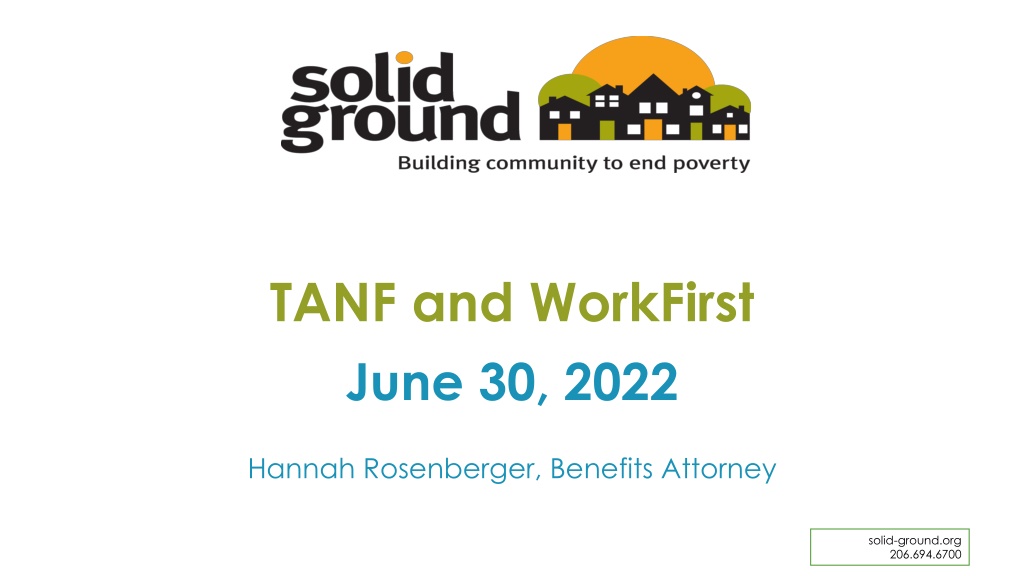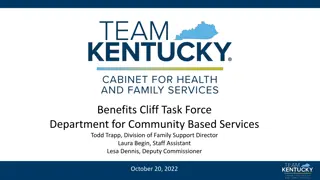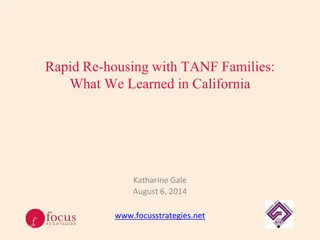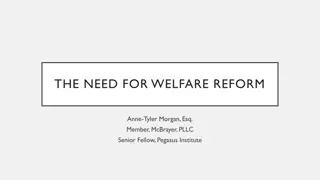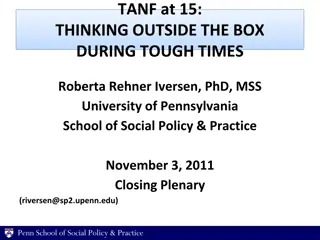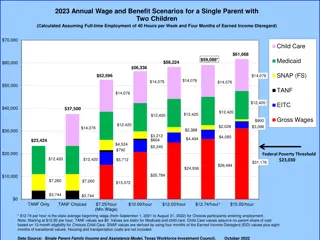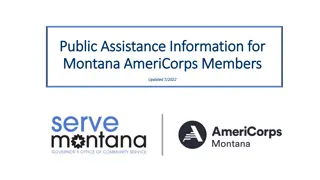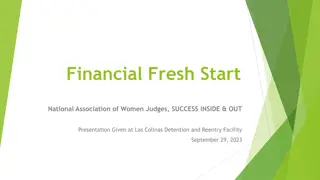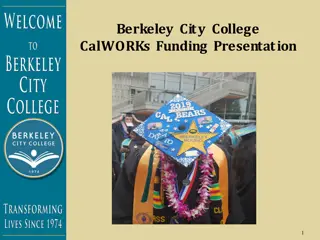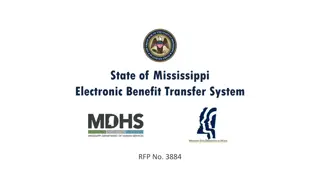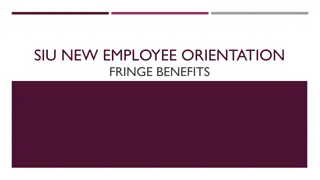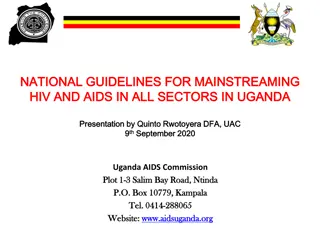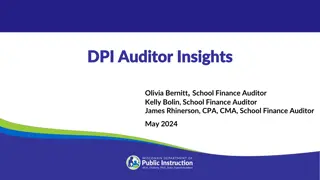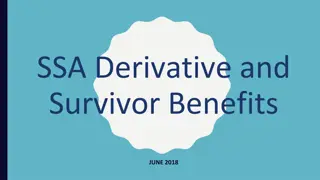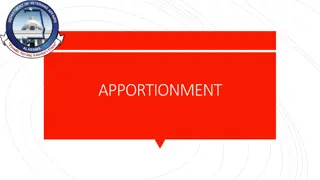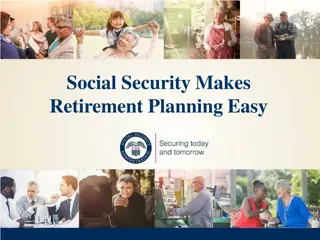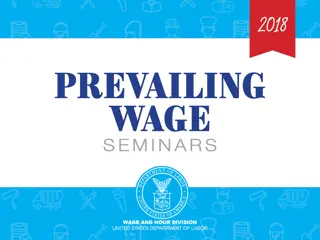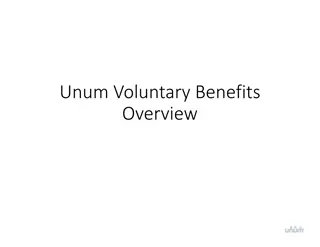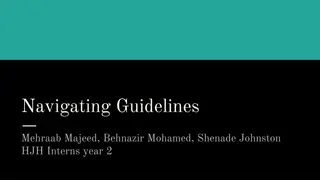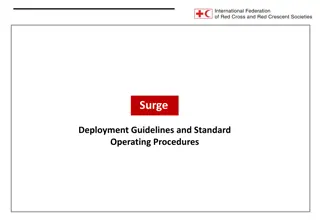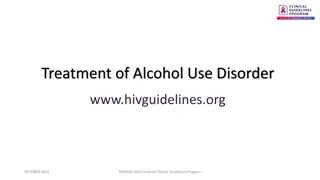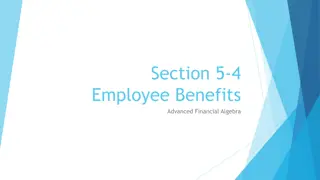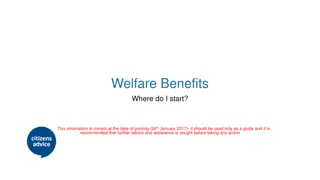Understanding TANF Benefits and Guidelines
Explore information on Temporary Assistance for Needy Families (TANF) program, including eligibility criteria, payment standards, income and resource limits, WorkFirst requirements, support services, available programs, and tips to navigate the process effectively. Be mindful of the systemic racism embedded in public benefits policies. Stay informed to avoid benefit pitfalls and learn about the hearing and appeals process.
Download Presentation

Please find below an Image/Link to download the presentation.
The content on the website is provided AS IS for your information and personal use only. It may not be sold, licensed, or shared on other websites without obtaining consent from the author. Download presentation by click this link. If you encounter any issues during the download, it is possible that the publisher has removed the file from their server.
E N D
Presentation Transcript
TANF and WorkFirst June 30, 2022 Hannah Rosenberger, Benefits Attorney solid-ground.org 206.694.6700
Before we begin. Remember that public benefits laws and policies are steeped in systemic racism. http://theconversation.com/how-racism-has-shaped-welfare-policy-in-america- since-1935-63574 https://slate.com/human-interest/2018/06/trump-administrations-fixation-on- work-requirements-for-snap-benefits-is-part-of-a-long-racist-policy-history.html Be aware of the impact of casual racism and stereotypes when speaking about recipients of public assistance. https://www.npr.org/sections/codeswitch/2018/06/08/616684259/why-more- white-americans-are-opposing-government-welfare-programs https://www.huffingtonpost.com/entry/americans-welfare-perceptions- survey_us_5a7880cde4b0d3df1d13f60b solid-ground.org 206.694.6700
Topics Covered TANF Overview TANF WorkFirst WorkFirst Support Services TANF Sanction Process Additional programs available to TANF Families Tips to Avoid Benefit Pitfalls Hearing and Appeals Process solid-ground.org 206.694.6700
Temporary Assistance for Needy Families (TANF) Cash assistance program available to low-income families. Eligibility is based on gross monthly income (before taxes), family size, resources, and citizenship status. Benefit is available for 60 months in a participant s lifetime. **there are some exceptions to this time-limit Must participate in WorkFirst (Path to Employment program) Must follow an Individual Responsibility Plan (IRP) Pregnant or parenting teens may be eligible for TANF if in an approved living arrangement solid-ground.org 206.694.6700
TANF Payment Standards (2022) Unit Size Payment Standard Unit Size Payment Standard 1 $417 6 $1,009 TIP: If you are not sure if your client is eligible, check out WashingtonConnections.org. Click See if I qualify 2 $528 7 $1,165 3 $654 8 $1,289 4 $771 9 $1,416 5 $888 10+ $1,539 solid-ground.org 206.694.6700
TANF Income and Resource Limits Income: Earned Income - If your income is from a job, you can divide the amount you make in half (50%) and compare that to the income chart to see if eligible. Unearned Income - Income from another source such as unemployment, Social Security, etc,. then you must take the full amount (dollar for dollar) and income must be less than the Payment Standard Resources: Less than $6,000 in liquid resources cash, savings/checking accounts, stocks, bonds, mutual funds A vehicle worth less than $10,000 Earned Income Limits Number of family members 1 Maximum earned income level $834 Number of family members 6 Maximum monthly earned income level $2,018 2 3 1,056 1,308 7 8 2,330 2,578 4 1,542 9 2,832 5 1,776 10 or more 3,078 WAC 388-478-0035 solid-ground.org 206.694.6700
Other Eligibility Requirements for TANF Immigration Status/Lawfully Present State Family Assistance Program for families that are not eligible for TANF because of immigration status Washington State residents Responsible for the care of children or who are pregnant *Caring for a relative's child, or legal guardians or are acting in the place of a parent may also apply for TANF benefits on behalf of these children solid-ground.org 206.694.6700
In Loco Parentis/Legal Guardian/Child only TANF Persons who are caring for a relative's child, or legal guardians or are acting in the place of a parent are also able to apply for TANF benefits on behalf of these children Or if parents are ineligible for TANF for certain reasons other than income Relatives of a specified degree that care for a minor relative child in their home. A relative of specified degree includes: Siblings Nephews/Nieces Aunts/Uncles Grandparents First Cousins TIP: To be considered as acting in the place of a parent, the adult must have intentionally taken the place of a parent and be responsible for exercising day-to-day care and control of the child. solid-ground.org 206.694.6700
Cooperate with Division of Child Support If you are found eligible for the TANF Program, you must cooperate with the Division of Child Support to set up a child support order from the non-custodial parent. BUT you may request not to cooperate if it's not safe to do so. This is called a Good Cause Exception. Cooperating with DCS would result in serious physical or emotional harm to you or the child in your care. solid-ground.org 206.694.6700
Exemptions and Extensions There is a 60-month (5 year) Lifetime limit on receiving TANF/SFA Exemptions: An older needy caretaker relative (55 and older) Caring for an adult relative with disabilities Caring for a child with special needs An adult with severe and chronic disabilities Hardship Extensions: You are working at least 32 hours a week. You are a survivor of family violence. You are working with the Children s Administration on child welfare issues involving any of your children in a dependency case for the first time. You are homeless. COVID 19 Hardship Extension - All TANF recipients will receive a COVID 19 TLE through June 2023 This means clients should not be terminated from TANF even if they reach 60 months TIP: If someone was terminated from TANF due to the 60-month timeline, they can reapply under COVID emergency rules solid-ground.org 206.694.6700
Tips for Application Process If the family is homeless, make sure that is clear on the application (especially if client is using a friend/family member s address on the application. If possible, provide proof of income with application or shortly thereafter. Applications can be delayed if DSHS is waiting for proof of income. If client just lost their job or stopped working for any reason, you might need a Stop Work Form (DSHS 14-438) to prove to DSHS the client lost their income. Advocates can go with clients to TANF/WorkFirst meetings! This is a good opportunity to advocate for the client with the person making decisions. solid-ground.org 206.694.6700
Questions? solid-ground.org 206.694.6700
TANF - WorkFirst Program WorkFirst requires TANF recipients to search for and maintain employment, or engage in community services. Most TANF recipients are required to participate in employment, job search, education or job training for 30-40 hours per week. Clients sign an Individual Responsibility Plan (IRP) outlining these requirements. Must attend a WorkFirst Orientation WorkFirst families can receive a variety of support services to help overcome barriers to employment. solid-ground.org 206.694.6700
Exemptions from WorkFirst You have a baby under 1 year old. You are 55 years or older and take care of someone s child. You have a severe and chronic disability. You care for a special needs child. You care for a relative with a disability. WorkFirst Participation requirement was suspended during the COVID 19 Pandemic but it is now reinstated solid-ground.org 206.694.6700
Individual Responsibility Plan (IRP) A contract that says what you must do to work, look for work, or get ready to look for work. It also lists support services to help you get a job. If you do not do an activity listed in your IRP, DSHS will sanction you (reduce your benefits) just as if you had failed to take part in job search. IRPs can be negotiated AND must be agreed on by both parties. TIP: Advocates can attend WorkFirst meetings and help client s advocate for a reasonable IRP that they can follow. solid-ground.org 206.694.6700
Comprehensive Evaluation Part of the process to get an IRP DSHS will talk with client about their work background/experiences and why they are not working, and about what activities and services would help the applicant get a job. The DSHS worker may assign services and activities they believe will make the participant employable. Ex: Resume Writing Class DSHS must involve participant in this decision. Participant and DSHS worker will agree on and sign an Individual Responsibility Plan (IRP). solid-ground.org 206.694.6700
solid-ground.org 206.694.6700
solid-ground.org 206.694.6700
WorkFirst Support Services Childcare Subsidies Work clothing/Uniform Haircut Personal Hygiene Transportation assistance/Gas Cards/Bus Passes Educational expenses Vehicle repair Tools and equipment Licensing fees/Union Fees Relocation expenses TIP: To learn more about these support services, check out https://workfirst.wa.gov TIP: Support Services Directory https://www.dshs.wa.gov/sites/defa ult/files/ESA/wf- manual/Support%20Services%20Dir ectory.pdf solid-ground.org 206.694.6700
Tips for WorkFirst Read the IRP thoroughly and make sure it is something you can follow. Advocates can attend WorkFirst meetings and advocate for a reasonable IRP for clients If a client is homeless, they don t have to engage in a job search if they are conducting activities identified on the IRP to help with find housing. If a client has health problems, they don t have to engage in a job search if they are conducting activities identified on the IRP to help with their current health issues. There are other reasons why a person would not have to engage in a job search check out WAC 388-310-0400 for a full list. They can still use WF Support Services! solid-ground.org 206.694.6700
Tips for WorkFirst Cont. When working with clients that are unhoused, the goal of the IRP can be to conduct housing related activities to establish safe and stable housing. Examples: Meeting with a housing stabilization case manager at their current shelter once a month Meet with a DV advocate at the YWCA once a month. Obtain documents needed for housing, such as replacement ID or children s birth certificates. Attend counseling sessions. solid-ground.org 206.694.6700
Questions? solid-ground.org 206.694.6700
TANF WorkFirst Sanctions What is a Sanction? It is a penalty (punishment). It lowers the amount of TANF (Temporary Assistance for Needy Families) you get. DSHS can sanction you, or stop your TANF altogether, if it decides you failed or refused without good reason to do everything in your Individual Responsibility Plan (IRP) or to meet some other WorkFirst requirements. *Your medical assistance will not change with sanctions or if DSHS closes your TANF. solid-ground.org 206.694.6700
Sanction Process DSHS will lower your grant by the greater of one person's share or 40%, whichever is more, after you do not meet your IRP or WorkFirst requirements for 2 months. After 12 months in a row in sanction, DSHS will end (stop) your TANF grant. DSHS should let you fix ( cure ) the sanction so you can get out of sanction status DSHS will send letters and schedule meetings before starting a sanction. solid-ground.org 206.694.6700
Sanction Process Cont. 1) DSHS sends a letter about the non-compliance. 2) DSHS schedules a meeting called a case staffing mtg. Was there a good reason for not complying? DSHS will screen for family violence and other barriers and consider that in making this decision. 3) DSHS decides if there was a good reason for not following the IRP. If yes = no sanction; If no = sanction. 4) DSHS sends a letter at least 10 days before the sanction starts that explains why sanction and how to fix sanction and includes appeals rights information. 5) After 10 days DSHS will lower TANF grant. solid-ground.org 206.694.6700
Why are people sanctioned? You might be sanctioned if DSHS decided that you failed or refused without good reason to do at least one of these: Give your DSHS case manager info they need to make or update your IRP. Go to appointments listed in your IRP. Show you are doing your best to do everything in your IRP. Take a job that complies with labor laws and does not have unreasonable working conditions, hours, demands, or conditions. solid-ground.org 206.694.6700
What are good reasons? A serious physical, mental or emotional condition interfered with your ability to follow your IRP. Someone threatened you with, or subjected you to, family violence. DSHS did not send you a notice telling you what information they needed or about the appointment you missed. You could not find affordable, appropriate childcare for your child under age 13 within a reasonable distance. Your transportation or childcare arrangements broke down. You could not make new ones in time. You had an immediate legal problem, such as an eviction notice. You are or should have been designated a person receiving Equal Access (formerly NSA ) services. DSHS failed to make this designation or failed to make or follow an accommodation plan. solid-ground.org 206.694.6700
Tips to avoid sanctions Call the DSHS worker on the number on your IRP as soon as you know you won t be able to comply with the IRP or as soon as it happens. You can explain what happened and why it was beyond your control (ex: car broke, laid off from job, had to move suddenly, lost childcare provider) If you can t get ahold of the caseworker, leave a detailed message and keep your own record of the date/time you called. DSHS will schedule a meeting before they sanction you Advocates can attend these meetings with clients! solid-ground.org 206.694.6700
July 2021 Reset If your TANF was closed due to sanction before July 1 2021 and if you now reapply, your case will reopen not in sanction status If your TANF was closed due to sanction after July 1, 2021, you must take part in a work activity for 4 weeks before you can get TANF again. If your case closed for another reason while you were in sanction status and is reopened, you will reopen at your reduced grant level. Example: Your case closed while you were in month four of your reduction sanction. Your grant will be opened in month five of grant reduction sanction status. solid-ground.org 206.694.6700
Questions solid-ground.org 206.694.6700
Working Connections Childcare Program (WCCC) Program that helps families with children pay for childcare (subsidy is paid directly to approved provider). Child receiving care must be a citizen or legal resident Two types: WorkFirst families for "approved activities" (can include something other than employment, such as school or job training) Working families with income at or must be at or below 60% of the State Median Income (SMI) at application or 65% of SMI when reapplying Families pay a co-pay directly to provider (can be as low as $0/month or up to $215/month) solid-ground.org 206.694.6700
Diaper Subsidy Families with young children (under 3) on TANF will receive an additional $100/month as a cash increase, starting November 1, 2023. solid-ground.org 206.694.6700
Emergency Cash Assistance for TANF families AREN (Additional Requirements for Emergent Needs): Have an emergent need to get or keep housing or utilities and have good reason for the need. Maximum benefit is $750 in a 12 month period. In some cases, can receive more if related to health and/or safety. Diversion: Alternative assistance for families who have a short term need and do not wish to receive TANF. Maximum benefit is $1,250. Must repay a pro-rated portion of the grant if on TANF before one year. CEAP (Consolidated Emergency Assistance Program): Cash program available to families or pregnant individual who face an emergency and do not have the money to meet their basic needs, including families whose TANF cash assistance has been terminated in sanction and those who have already received 60 months of TANF and do not qualify for a Time Limit Extension. Assistance is limited to not more than thirty consecutive days within a period of twelve consecutive months. solid-ground.org 206.694.6700
What to Report to DSHS The approval letter should clearly state: What needs to be reported between reviews How to report it You move or someone (including a child) moves out of your home Your total gross monthly income goes over the payment standard Remember: Child support is unearned income so if it increases, report to DSHS You have liquid resources of more than $6000 You have a change in employment or approved work activity Report by calling DSHS at 877-501-2233 TIP: Keep your own record of reporting solid-ground.org 206.694.6700
When to Report to DSHS Report changes by the tenth day of the month following the month the change happened. For changes in income, the date a change happened is the date you receive income based on this change. For households receiving TANF/SFA, if a child in your assistance unit (AU) will be gone from your home longer than one hundred eighty days, you must report it within five calendar days (TANF grant may end) If the child will be gone temporarily or less than 180 days, the parent can still receive a TANF grant for parent + child. solid-ground.org 206.694.6700
How to Avoid Benefits Pitfalls Report Changes in Circumstances Comply with Program Requirements Report required changes in household income, household size, or resources by the 10th day of the month following the change. Comply with the WorkFirst Program, as outlined by your Individual Responsibility Plan (IRP). OR tell DSHS why you cannot comply. Contact DSHS or BLA if you are in doubt about what needs to be reported. solid-ground.org 206.694.6700
How to Avoid Benefits Pitfalls, cont. Request an Equal Access Plan Designate an Authorized Representative Someone you designate to represent you when you apply for or receive benefits with DSHS. The individual or organization is authorized to act on behalf of the client for eligibility purposes. They can also receive copies of all your DSHS notices. DSHS must provide Necessary Supplemental Accommodations to all persons with a mental, neurological, physical or sensory impairment or other limitation that prevents them from accessing or maintaining benefits in the same way that an unimpaired person would. solid-ground.org 206.694.6700
What do to if something goes wrong? If benefits are denied, reduced, sanctioned or terminated: Request a Hearing How to request a hearing? Call or write DSHS or the Office of Administrative Hearings. You have the right to be represented by an attorney DSHS Customer Service 1-877-501-2233 Office of Hearing Administration 360-407-2700 or 800-583-8271 solid-ground.org 206.694.6700
Deadlines to Request a Hearing 90 days to request a hearing from the adverse action (termination, denial, or change in benefits). Continuing Benefits. You can keep getting your benefits while you are waiting for you hearing. Ask for this within 10 days of the date on the DSHS notice. If the tenth day falls on a weekend or holiday, you have until the next business day to ask for a fair hearing to get continued benefits. solid-ground.org 206.694.6700
Ask a Lawyer Program Email questions or real-life scenarios to benefitslegalhelp@ solid-ground.org Put Ask a Lawyer in the subject line and Public Benefits attorney will respond. Have a question about the application process? Have a question about eligibility? Have a question about qualifying for a WorkFirst exemption? Is your client in sanction status and need help appealing? Have a question about what support services your clients can get through WorkFirst? solid-ground.org 206.694.6700
Referrals to Benefits Legal Assistance For General Referrals To Contact us Directly with Specific Questions Intake line: 206.694.6742 (client or advocate can leave message and we will return call within 24 hours) General Email: benefitslegalhelp@solid- ground.org April Mazur, Social Worker, Aprilm@solid-ground.org Janelle Stark, Legal Assistant (manages all intakes) janelles@solid-ground.org Hannah Rosenberger, Staff Attorney, hannahr@solid- ground.org Will Ross, Benefits Attorney, willr@solid-ground.org solid-ground.org 206.694.6700
